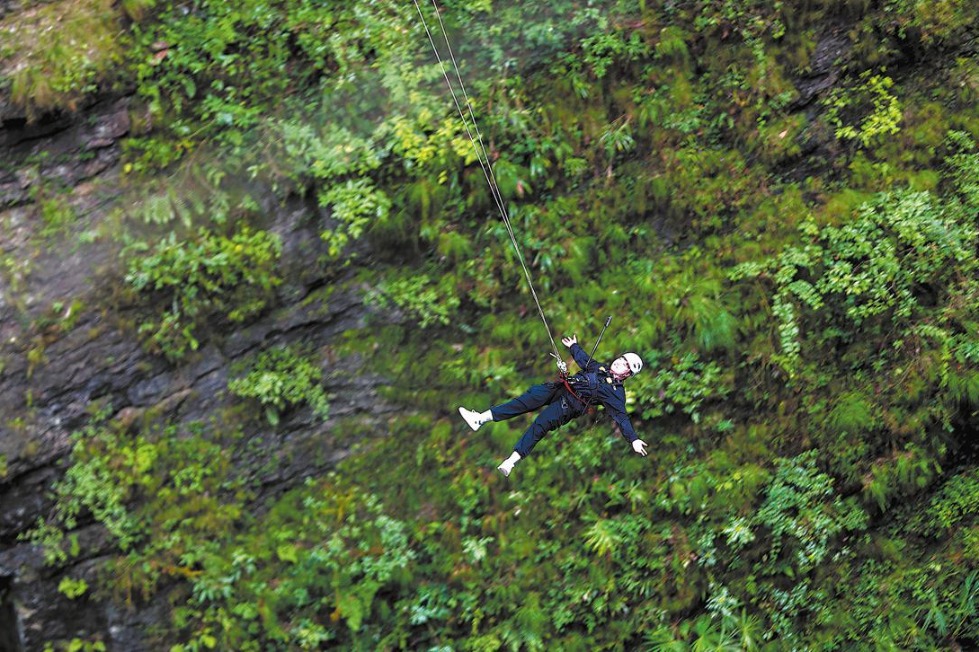Country advances national park system, enhancing ecological conservation

China has made significant strides in promoting its national park system, with improvements noticeable in the diversity, stability and sustainability of ecosystems, said Liu Guohong, head of the National Forestry and Grassland Administration.
He made the remarks while addressing the opening ceremony of the third National Park Forum in Chengdu, the capital of Sichuan province, on Tuesday.
"The establishment of a national park system with Chinese characteristics is a major institutional reform for ecological civilization, personally planned, initiated and advanced by General Secretary Xi Jinping," Liu added.
The landmark project, which aims to protect over 1.1 million square kilometers of natural reserves, is a significant initiative in building a beautiful China and advancing the modernization of harmonious coexistence between humans and nature, he said.
Liu highlighted the remarkable progress made in each of the country's first five national parks, which have integrated over 120 natural reserves to coordinate the comprehensive protection and systematic management of mountains, rivers, forests, farmlands, lakes, grasslands and deserts.
He said the Giant Panda National Park, for instance, has succeeded in connecting the main distribution and breeding habitats of wild giant pandas.
The Northeast China Tiger and Leopard National Park has seen the number of its two endangered species — Amur tigers and leopards — increase from 27 and 42 to 70 and 80, respectively, he said. In Hainan Tropical Rainforest National Park, the Hainan gibbon, once nearly extinct, has become the only gibbon population in the world to mark continuous growth.
Liu also highlighted the country's efforts to enhance its people's sense of gain and happiness as it advances with building national parks.
China has successfully introduced new development opportunities for local communities through various initiatives, including ecological relocation, franchising and involving residents in volunteer services and public welfare jobs.
Currently, nearly 50,000 local residents, for instance, work as ecological guardians in the first five national parks, earning an annual income ranging from 10,000 yuan ($1,392) to 20,000 yuan, he said.
Tanya Steele, CEO of the World Wide Fund for Nature, United Kingdom, lauded China's commitment to developing the world's largest national park system as an initiative "not only ambitious but also transformative".
"China's national park system is more than a conservation project. It plays a wider role in China's broader vision of an ecological civilization," she said.
She stressed that the national park system underpins China's strong commitment to environmental leadership as an ambitious and a science-based effort.
It is expected to showcase how well managed protected areas play a key role in advancing global environmental goals, including the Kunming-Montreal Global Biodiversity Framework and its ambitious "30x30" target.
Adopted under China's presidency in 2022, the framework aims to ensure that by 2030, at least 30 percent of areas of degraded terrestrial, inland water and coastal and marine ecosystems are under effective restoration.
China's national parks are more than protected areas. They offer opportunities for learning and exchange on conservation practice, she said.
Steele said she looks forward to seeing China's national park system demonstrate how conservation and sustainable development can be pursued together, not as opposing forces, but as complementary priorities.
"This is the opportunity before us to shape a future where national parks are not only about preserving ecosystems, but about reimagining how people and nature can thrive side by side," she said.
Jonathan Austin, New Zealand's ambassador to China, commended the leadership role China played in the adoption of the Kunming-Montreal framework and also the country's continued commitment to biodiversity, including its plan to expand national parks to cover 10 percent of its land area.
National parks, as one of the most powerful tools to safeguard nature, are central to achieving the global goal for nature set out in the framework — to halt and reverse biodiversity loss by 2030, he noted.
"New Zealand is pleased to work alongside China and other nations in this global effort. Together, through cooperation, innovation and shared purpose, we can secure a future where nature thrives and where our national parks continue to inspire, protect and sustain life for generations to come," the ambassador said.
houliqiang@chinadaily.com.cn
- Country advances national park system
- New policy fuels rise in fertility treatments
- Xizang strides toward modernization
- Envoys hail China's panda conservation, seek wider ties
- China's national park system hailed
- Guangzhou man detained for allegedly impersonating serviceman and State Council counselor





































